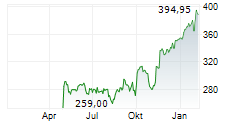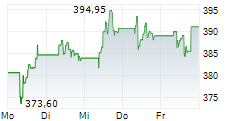- Elecsys pTau181 is the first In Vitro Diagnostic Regulation (IVDR) certified test to rule out Alzheimer's associated amyloid pathology.
- The minimally invasive, blood-based test can serve as a rule out for Alzheimer's pathology, reducing the need for confirmatory testing with a negative result.
- Data from clinical study supports use in primary care for people with varying signs of cognitive decline.
Basel, 23 July 2025 - Roche (SIX: RO, ROG; OTCQX: RHHBY) announced today it has received CE Mark for its Elecsys® pTau181 test to measure phosphorylated Tau (pTau) 181 protein which is an indicator of amyloid pathology, a hallmark of Alzheimer's disease. The test, which has been developed in collaboration with Eli Lilly and Company, can be used by clinicians in conjunction with other clinical information to rule out Alzheimer's disease as the cause of cognitive decline. This could avoid the need for further confirmatory investigation for patients testing negative.
"The burden of Alzheimer's disease on society and healthcare systems is increasing as the world's population ages," said Matt Sause, CEO of Roche Diagnostics. "With Elecsys pTau181, doctors can give patients and their caregivers the clarity they need when establishing the cause of cognitive decline. By enabling an earlier and less invasive diagnosis, this test has the potential to improve patient outcomes and decrease costs for healthcare systems worldwide."
Barriers to early and accurate diagnosis of Alzheimer's disease exist across the world. Up to 75% of people living with symptoms are not diagnosed, and those who have received a diagnosis waited nearly three years on average after symptom onset.1 The identification of amyloid pathology is critical for Alzheimer's diagnosis and treatment. Current methods to confirm amyloid pathology - including positron emission tomography (PET) and cerebrospinal fluid (CSF) assessment - can be expensive, difficult to access and invasive. With a negative Elecsys pTau181 blood test, people can avoid further unnecessary investigations for Alzheimer's using CSF or PET and can identify the care pathway that is right for them.
Clinical study results support that the test can be implemented effectively across care settings, including primary care, where most patients first seek help for cognitive concerns. Those with positive results are then able to undergo further testing, supporting earlier identification of Alzheimer's pathology. This is key to accessing new treatments that are most effective when used early in the disease progression, enabling patients to make informed decisions about their future care.
Clinical data support the Elecsys pTau181 test for varying signs of cognitive decline
The CE Mark for the Elecsys pTau181 blood test was based on data from a prospective, multicentre study, which included 787 patients across the US, Europe and Australia. The study showed the test was able to rule out Alzheimer's disease with a high negative predictive value (NPV) of 93.8% based on a 22.5% prevalence of amyloid positivity according to positron emission tomography (PET) scans, with 83.6% sensitivity. The rule out performance of the test was only minimally impacted by the patients' age, gender, body mass index or impaired kidney function.
This global, prospectively-collected, diagnostic registrational clinical study was the first of its kind in the industry to investigate the test's clinical performance in a diverse patient population, aged 55-80 years old that reflects as closely as possible the patients who could benefit from the test. It involved a subset of patients from a wider study looking at a highly diverse set of patients with broad inclusion criteria, to ensure the test could be used effectively across different geographies and ethnicities.
Elecsys pTau217 blood test
Roche is also developing the Elecsys pTau217 blood test, an in-vitro diagnostic immunoassay for the quantitative determination of the protein Phospho-Tau (217P) in human plasma for use as an aid in identifying amyloid pathology. Recent data presented on Elecsys pTau217 showed that it was able to accurately detect amyloid pathology and was more stable than a pTau217/Aß42 ratio in blood and plasma samples at room and refrigerator temperatures. Together with the high throughput and full automation of the assay, these data support the potential of Elecsys pTau217 as an accurate standalone test that could be scaled up for broad implementation in routine clinical practice worldwide across Roche's unmatched installed base.
About Roche in Alzheimer's
With more than two decades of scientific research in Alzheimer's disease, Roche is working towards a day when we can detect and treat the disease early, in order to stop or even prevent its progression to preserve what makes people who they are. Today, the company's Alzheimer's disease portfolio spans investigational medicines for different targets, types and stages of the disease, including trontinemab. On the diagnostics side, it also includes approved and investigational tools, including digital, blood-based tests and CSF assays, aiming to more effectively detect, diagnose and monitor the disease. Yet the global challenges of Alzheimer's disease go well beyond the capabilities of science, and making a meaningful impact requires collaboration both within the Alzheimer's community and outside of healthcare. Roche will continue to work together with numerous partners with the hope to transform millions of lives.
About Roche
Founded in 1896 in Basel, Switzerland, as one of the first industrial manufacturers of branded medicines, Roche has grown into the world's largest biotechnology company and the global leader in in-vitro diagnostics. The company pursues scientific excellence to discover and develop medicines and diagnostics for improving and saving the lives of people around the world. We are a pioneer in personalised healthcare and want to further transform how healthcare is delivered to have an even greater impact. To provide the best care for each person we partner with many stakeholders and combine our strengths in Diagnostics and Pharma with data insights from the clinical practice.
For over 125 years, sustainability has been an integral part of Roche's business. As a science-driven company, our greatest contribution to society is developing innovative medicines and diagnostics that help people live healthier lives. Roche is committed to the Science Based Targets initiative and the Sustainable Markets Initiative to achieve net zero by 2045.
Genentech, in the United States, is a wholly owned member of the Roche Group. Roche is the majority shareholder in Chugai Pharmaceutical, Japan.
For more information, please visit www.roche.com.
All trademarks used or mentioned in this release are protected by law.
References
[1] Alzheimer's Disease International. World Alzheimer Report 2022 [Internet; cited April 2025]. Available from: https://www.alzint.org/resource/world-alzheimer-report-2022/. Last accessed: April 2025
Roche Global Media Relations
Phone: +41 61 688 8888 / e-mail: media.relations@roche.com
| Hans Trees, PhD Phone: +41 79 407 72 58 | Sileia Urech Phone: +41 79 935 81 48 |
| Nathalie Altermatt Phone: +41 79 771 05 25 | Lorena Corfas Phone: +41 79 568 24 95 |
| Simon Goldsborough Phone: +44 797 32 72 915 | Karsten Kleine Phone: +41 79 461 86 83 |
| Kirti Pandey Phone: +49 172 6367262 | Yvette Petillon Phone: +41 79 961 92 50 |
| Dr Rebekka Schnell Phone: +41 79 205 27 03 |
Roche Investor Relations
| Dr Bruno Eschli Phone: +41 61 68-75284 e-mail: bruno.eschli@roche.com | Dr Sabine Borngräber Phone: +41 61 68-88027 e-mail: sabine.borngraeber@roche.com (mailto:sabine.borngraeber@roche.com) |
| Dr Birgit Masjost Phone: +41 61 68-84814 e-mail: birgit.masjost@roche.com |
Investor Relations North America
| Loren Kalm Phone: +1 650 225 3217 e-mail: kalm.loren@gene.com |
Attachment
- Media Investor Release Elecsys pTau181 CE Mark English (https://ml-eu.globenewswire.com/Resource/Download/e63c38cf-7b45-490e-93ea-a9d71920a00c)




